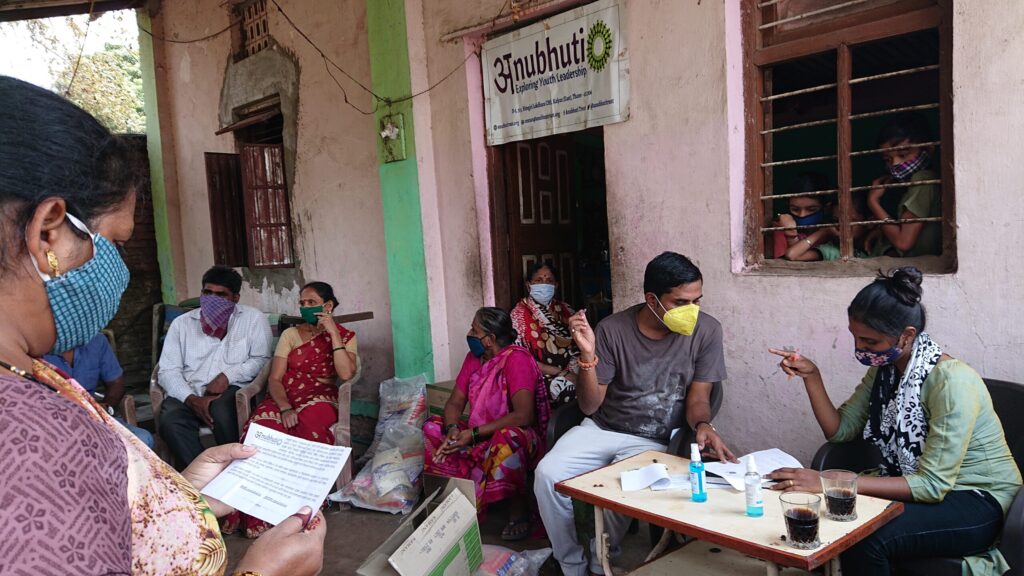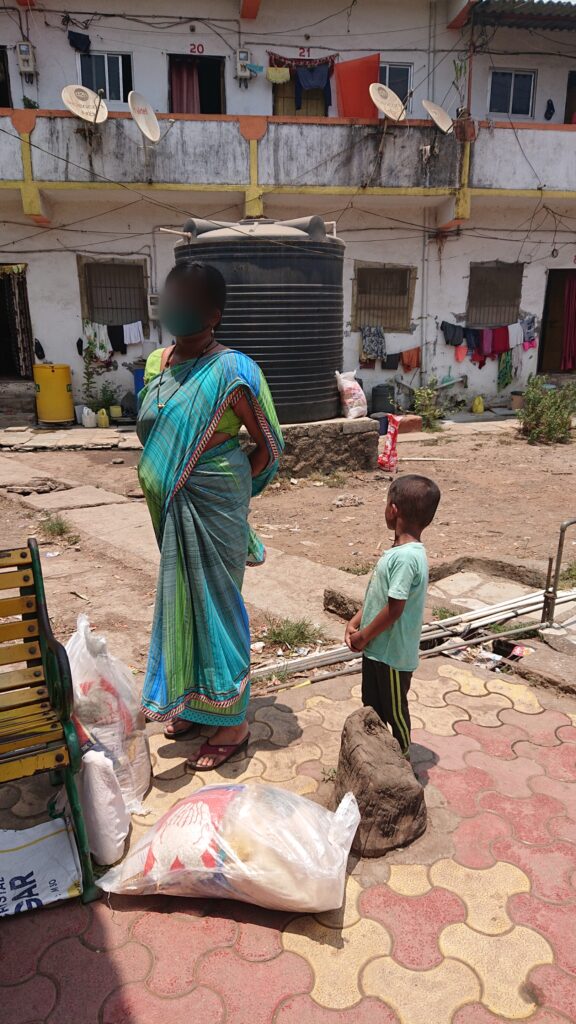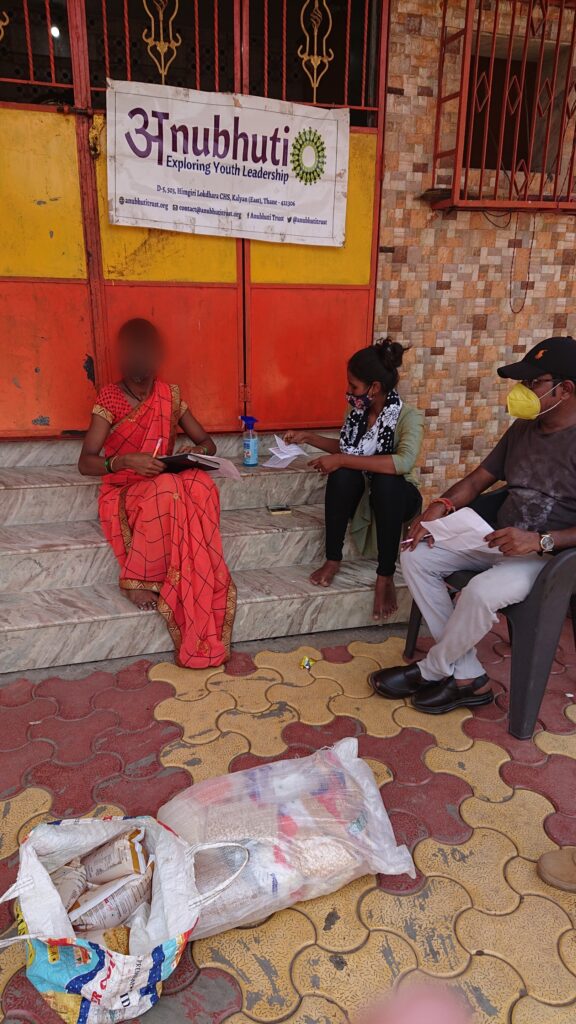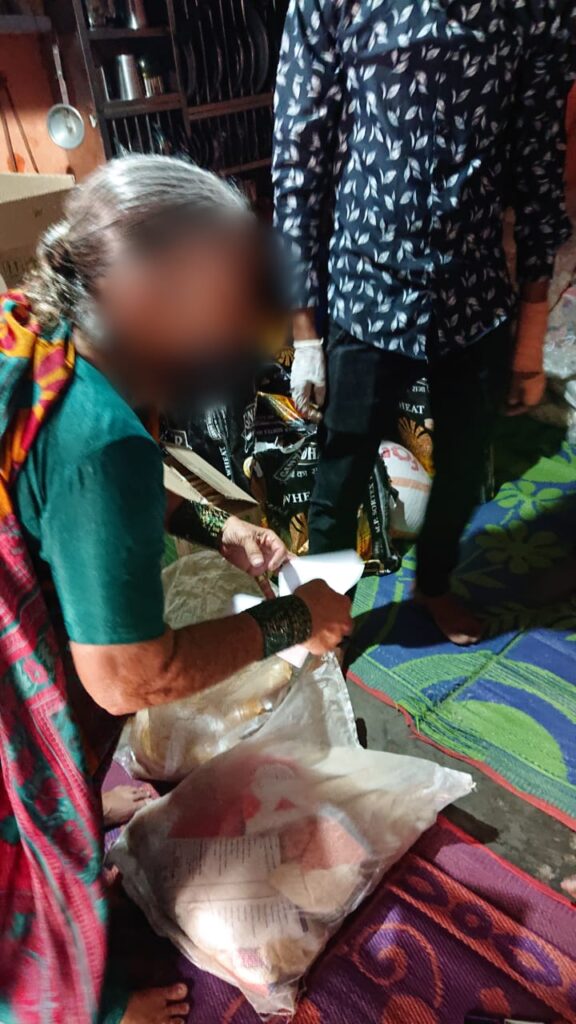Anubhuti started community counselling with Nomadic & Denotified tribes (NT-DNT) and other Bahujan communities since the pandemic second wave started gaining ground in early April this year. While Anubhuti’s main work is not related to relief, we took up the challenge last year, when the communities we work with suffered extreme financial hardship. Then, our people had been more afraid of starvation than the virus. We had then said that such calamities are difficult for everyone, but exponentially harder for communities like the NT-DNTs; the period was a double emergency for them – one of fundamental questions of food, shelter and survival which they struggle for as a matter of everyday life, and second of the multiplication of these problems due to the pandemic. This year is even worse, firstly because people are financially, mentally and physically depleted to start with, and secondly because the virus has reached the communities.
Community Counselling needed from a Grounded Perspective
The realities on ground are very different from what is being suffered by say a family stuck in-doors in a house. Even for privileged communities, this is the first time in our lifetime that we are facing a lockdown; youth or adults of today have not seen the wars of the 20th century when people had to follow curfew. Even those were probably not as long as the lockdown we are experiencing now for over a year.
To make matters worse in ground communities, there is a lot of misinformation, and any valid information about COVID that is reaching them, is usually not accessible because of the different contexts. For example, there is a lot of content on youtube or other social media giving ideas about nutritious food, checking one’s oxygen, how to sanitize food packets being brought in from outside, how to home quarantine, etc. But this information is far removed from the realities of life in tents or 10×10 rented homes. They can hardly afford two full meals a day, much less nutritious supplements, sanitizers, oxymeters and so on. There are too many factors such as availability of water, soap, toilets, space for quarantining, separate clothes and utensils for isolation and many other facilities which are simply not available here. Other than affordability, space and resources, the language of this information is too technical, difficult to grasp even by the adult generation who have not studied beyond class 3 or 5. When they visit doctors, the latter speak in a language which in many cases is different that what the people speak, and the terms used are too technical. It is the sad truth that society hasn’t facilitated the development of these communities, today resulting in very few medical professionals from the NT-DNTs, who would speak the language of the people.
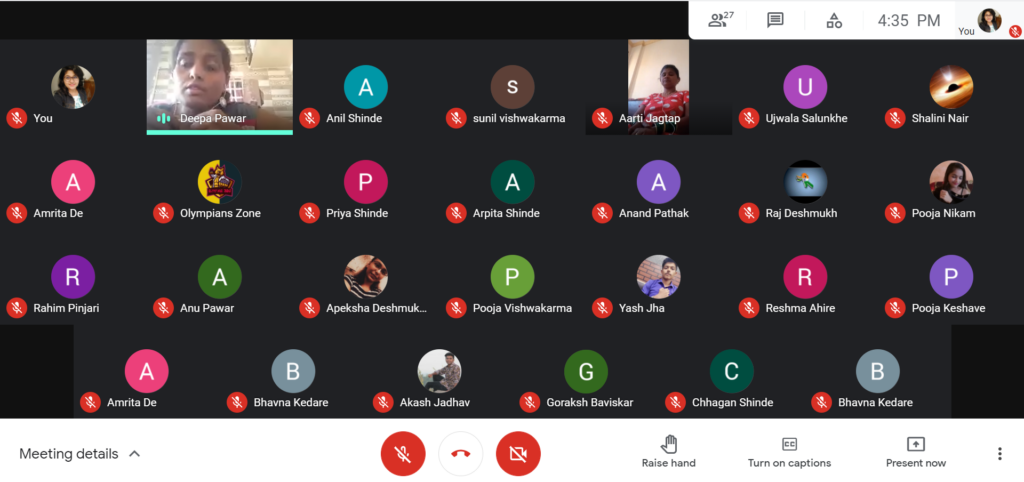
Keeping in mind these realities and needs, we started carrying out community counselling face to face where possible, and on phone or online where it is not safe due to high number of COVID positive cases. We are taking efforts to mainly reach youth and women, who are more vulnerable due to multiple marginalizations.
Community mental health counselling is especially needed because there is very poor mental health literacy, understanding or acceptance in communities. Mental health institutions or care providers are scarcely available. These are communities that cannot even reach helplines. Therefore, till communities cannot reach services, counselling services need to reach them. The magnitude and intensity of distress is more than in privileged communities, given that the intensity of challenges and struggles they face on a daily basis is a lot more – and even more exacerbated during this calamity. Anubhuti is therefore sensitively taking the initiative to take counselling to the community.
This counselling takes into account that ground communities have their own strengths born of struggle, which need to be understood and leveraged. The format of group counselling is being used, with the very positive result that people are openly sharing and discussing mental health in the group, motivating each other, connecting with each other, planning actions on the call and so on.
Relief and Counselling with Social Justice Lens – Reaching Women at Risk
Anubhuti’s relief work is carried out with a Constitutional approach, with lens of Social Justice, Rights and Mental Justice. Our disaster response not only provides immediate relief in form of ration, medical support, financial support, counselling, handling cases, etc. but is with the vision of long-term change. Relief engagements include giving appropriate information, creating relationships with the communities, building networks with and between community leaders, asking about any cases of mental distress who need support, constant communication to understand other issues of the community, planning for follow up, and planning for future work to solve the roots of the problems.
We have done this last year, when once the lockdown started opening up, our relief work developed into capacity building and disaster management trainings with community leaders, scholarships for girls, leadership training with youth and so on.
Keeping in mind the intersectionalities of vulnerability, we are taking special efforts to reach women within these communities, and among them, women who are more at risk in the pandemic and related socio-economic impacts. This is because even within more privileged families, women are bearing the brunt of the difficult circumstances. In already deprived communities, the hunger, restrictions, lack of mobility, no space for self, more household responsibilities, less nutrition, less healthcare are all more intensified for the women.
For example, women’s savings are being used up during this crisis for family needs. These are small quantities of emergency funds that a woman builds up painstakingly over years. The whole family is now depending on this. Once it is over, she will have lost all her financial safety net which she has created with lot of struggle. The family needs to be aware that they are dependant on the woman’s savings and should think of how to replenish this once the crisis is over.
Women’s health commonly gets neglected – this is coming out not only in the current counselling but observed in years of community work. They are used to being sick and still carrying on with their multiple responsibilities at home and outside. They have built themselves up to ignore health issues such as lack of sleep, headaches, various kinds of body pains which they face on regular basis and keep going. This is why, there is a risk that if they are COVID positive, their cases will get identified in later stages.
During the restrictions, women are taking up even more chores than usual in the house; while men are affected financially and mentally, they still go out to meet and discuss with their friends when possible. There is no such relief for women, who are doing even more work as the family is at home all the time, as well as taking up the major responsibility of finding and sourcing food for their families. The family in turn is also expecting more from her without understanding that when everyone wants some relief, women are being expected to step up even more. For example, when we ask youth and men in counselling sessions how many cups of tea they are drinking at home compared to before the lockdown, their answer is they are drinking more than double. However, they are not making the tea – it is their mothers or wives who make and serve it throughout the day. A simple thing like making many cups of tea through the day is a big chore when added to all the other work the woman does. It eats up into any little time she may have for herself. The young men are counselled that it is important that they and other family members realize this, and share more responsibility in the house, create opportunities for women’s rest and leisure time.
Another important matter that is discussed during sessions is women’s nutrition, which is neglected within the family even in normal times. In difficult times like the current, it is the women who eat even lesser, reducing her immunity in this raging pandemic. A youth shared how he himself and the family pay attention to his mother’s nutrition and rest only when she is very sick. All of the above is as true for privileged communities as it is on the ground, except that for the latter, women have to deal with added responsibilities and struggles with much lesser resources.
Among women in communities, there are intersections that make some women even more vulnerable. For example, pregnant women, single women, women with disabilities, women suffering from any medical issues, new mothers, breastfeeding women and so on. Because of their health status, they are more vulnerable to infections, and also more susceptible to mental distress. Anubhuti is taking special efforts to find and reach these women with counselling as well as other relief activities.
What the counselling consists of
A common counselling session starts with participants first being asked about their emotions, about how they are feeling. Youth and women have shared about their distress, confusion, loneliness, fear – of impending starvation and depletion of all avenues of money, the indignity of having to ask for help again and again, the dread if anyone in the family gets the infection how can they possibly pay the bills and so on. Youth are especially feeling lot of guilt and helplessness that they can do nothing as their parents slip into gloom and rage at the situation. Some families already have positive cases, leading to lot of fear and shame. This is causing even more risk, as families try to hide if they have a COVID positive member, and therefore do not isolate or quarantine them. Once again this is not their fault, because the resources needed for quarantining are not available, and there is no medical information guiding them on how to adapt what they have for what is needed to be done. To add to this, Bahujan communities have faced untouchability for thousands of years, and social distancing brings up these memories. Sensitive counselling is needed in these cases, where the counsellor is aware of the context and realities. Anubhuti is trying to provide this.
The youth and women are first being counselled to accept the situation. In most cases, this is much more easier said than done. For example, a young girl shared she has been living in a rented room alone for over a year because of various severe issues in her family, the last lockdown having separated them all. Now she has lost her job, cannot look for another one in the lockdown, is already almost 6 months behind her rent payment, has no money to buy even ration. Her feelings of loneliness, mounting debt, indignity of starvation, the dread of who is left to ask for help from – are crushing. There are many other stories of such desperation and no immediate solution in sight. An alarming number of youth are sharing about suicidal thoughts during counselling. Anubhuti is all too aware of these realities and while we counsel to accept the reality, we are working hard to find solutions to these problems. We realize that for now, there are very less mental health solutions to this deep distress, because people need answers to their fundamental problems. We are therefore carrying out relief activities including ration distribution and medical support.
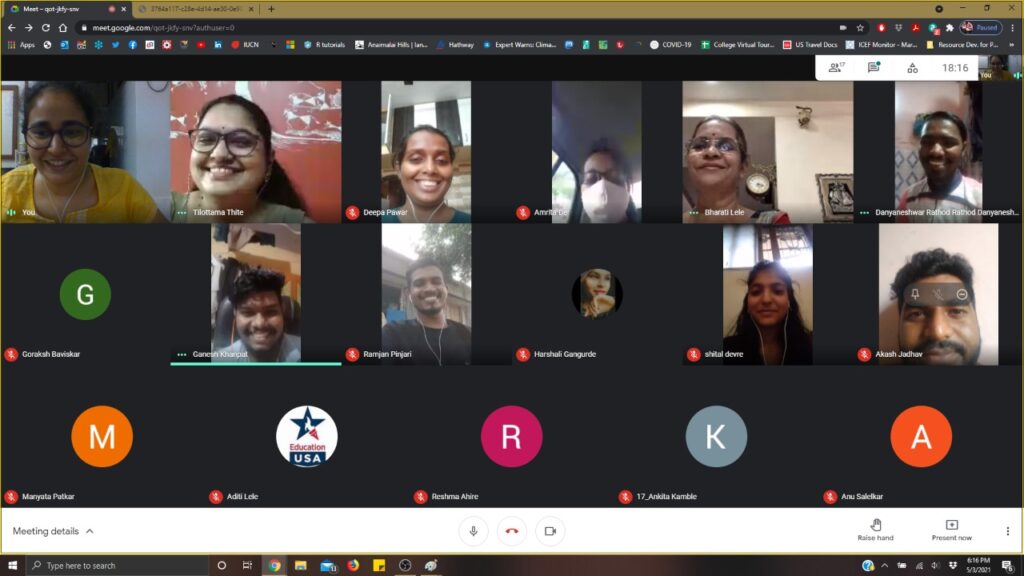
We are seeing a lot of negative storytelling in communities. Most of these stories – of corrupt hospitals and doctors, fake COVID testing labs, blackmarketing of medicines, the poor being taken advantage of or treated badly – are true experiences. But when these stories start making the round in communities, a lot of fear and distrust of the medical system as well as of the administration is created. While this may be justified, it again harms the poor themselves. This is leading to people not wanting to consult doctors if there are symptoms, willing to shell out lakhs of rupees (which they take on loans that they will be repaying for the rest of their lives) for private hospitals which some individual recommended instead of going to government hospitals, refusing to take the vaccine. Anubhuti identified this and we realized it is very important to provide examples of positive narratives which are also happening – which work towards solutions, instead of focusing only on the problems. I, being from a nomadic community, know how difficult this is, because the problems are all true, are many a times worse than what people are talking about, their weight is too much to bear; but I also know how important it is for people like mine to know about successful stories – we have nothing else that we can fall back upon. In our community counselling, we are working hard to provide these positive examples, create these examples where possible through our interventions.
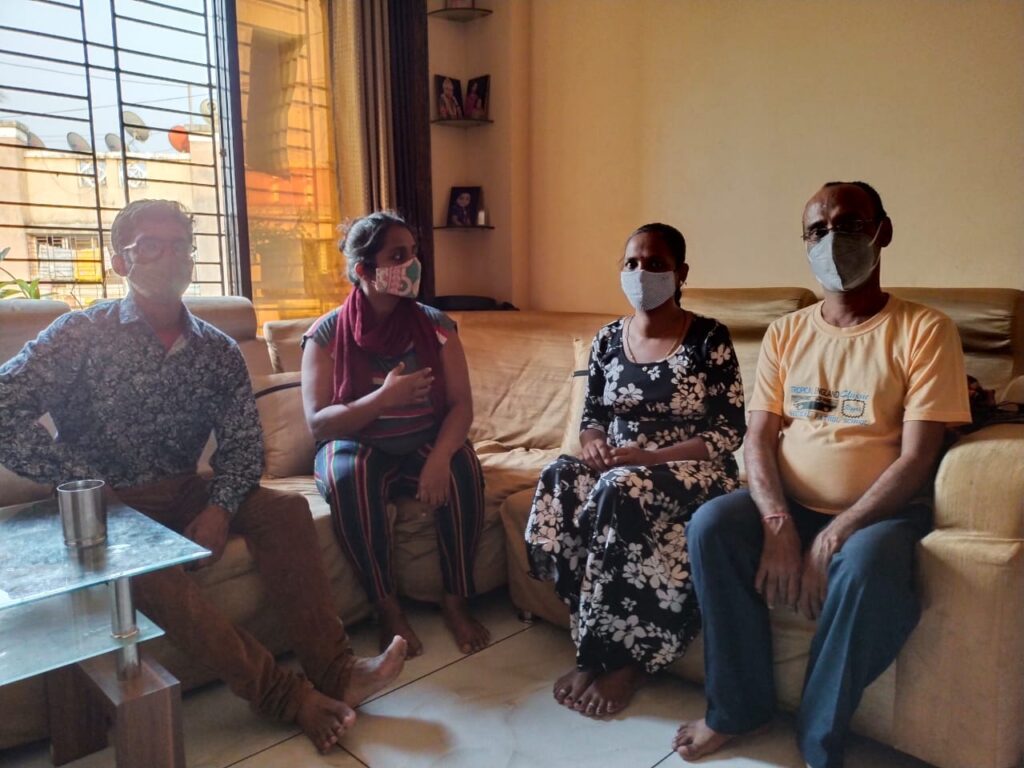
Since our usual work is building grassroot leadership for social change, we are motivating youth and community leaders to reframe their language and spread realistic positive messages in their communities. They are being involved in our relief work, vaccination awareness & registration drives, creating and distributing accessible IEC materials and so on. They are in turn contributing their ideas, counselling their parents and other elders about vaccination, looking out for those more vulnerable than them and connecting them to us and so on. Some positive examples:
- A community leader volunteered to encourage his people to take the vaccine, and is making a list of eligible persons who have agreed, so that we can help them register and get vaccinated.
- A NT woman changed her stance on if “COVID is real”, and is helping the above leader reach out to people.
- Women are bringing their sceptical partners to our online counselling, youth are bringing their parents and so on.
- Youth are taking up household chores that they never touched before so their mothers have more rest. They are paying attention to the nutrition of their female family members.
The common questions that the counselling covers are firstly, to accept and understand that the pandemic is a reality. The virus itself is explained in a language that people speak and understand. Processes like home quarantine, isolation, etc. are explained in context of what each family’s resources. Nutrition options that people can afford and find easily are explained. Many a times there already exist traditional nutritious foods that the community eats, that are encouraged. How to use a mask is explained; for example, to not re-use a mask the next day, to wash and dry it properly before re-use, and so on. Mentally preparing for what to do in the event that a family member or oneself gets infected is explained.
Each participant is asked about their financial situation, status of available resources, physical and mental health of their family and those around, and of any cases of violence, child marriage or other social issues that they have observed. Thus, cases needing intervention are identified.
Other than these, the group has many questions which are addressed. Some of these questions are given below:
- “We are studying online for over a year now. We are listening to content but not learning anything. Exams are not taking place.. I am afraid companies won’t hire us”
- “There is lot of confusion regarding payment of fees. College is saying we have to pay full fees even though there were hardly any classes, some of my classmates are saying they won’t.. What should I do? More importantly, I can’t even pay my rent, how to pay college fees? Is this the end of my education?”
- “While hospitals are overflowing with corona patients, what about other diseases? Aren’t people dying from those? How are they getting treatment?”
- “The same person tests negative in one place and gets a positive report from another place. Who do we trust? Are they all fake and making money off us?”
- “What kind of nutrition should we provide for a family member recovering from corona?”
- “How do we identify when to admit the patient to a hospital? Till they are at home, how should they take care to recover?”
- “We usually take motivation from doctors, but now we see even they are scared on social media.”
- “We want to study but our house is just one room, and everyone is staying in it all the time. If father gets drunk because of his tension in such a case, it is too much to bear. Where will we study then?”
- “How do we protect women in joint families – if there is a positive member, the women take care of them on top of serving others – who will take care of her?”
These questions are addressed in the group, and where severe cases are identified, personal counselling and case handling is done.
Some Results:
Despite the vastness of the challenges faced by communities, these group counselling sessions are proving to be successful in providing strength to fight these challenges:
- Cases of child marriage, suicidal tendencies, violence, mental health issues, medical issues, etc. are being identified by the group, who need in-depth attention and otherwise would have gone unnoticed.
- Resources and information are being shared by group members with each other.
- Positive experiences being shared on the group are providing motivating narratives to combat the negative stories in communities. For eg., there is a lot of misunderstanding and scepticism about vaccination in the community. On a group session, one young man who has taken the vaccine shared his experience, gave confidence that feeling side effects is a normal part of the process and exhorted everyone to take the vaccine.
- As given above, participants are taking leadership to take care of each other in the family and communities after the counselling sessions. They are increasing their understanding and carrying out isolation or quarantine when needed, registering for vaccines, etc.
- Most importantly, people on ground are openly discussing about their mental health without any kind of stigma.

